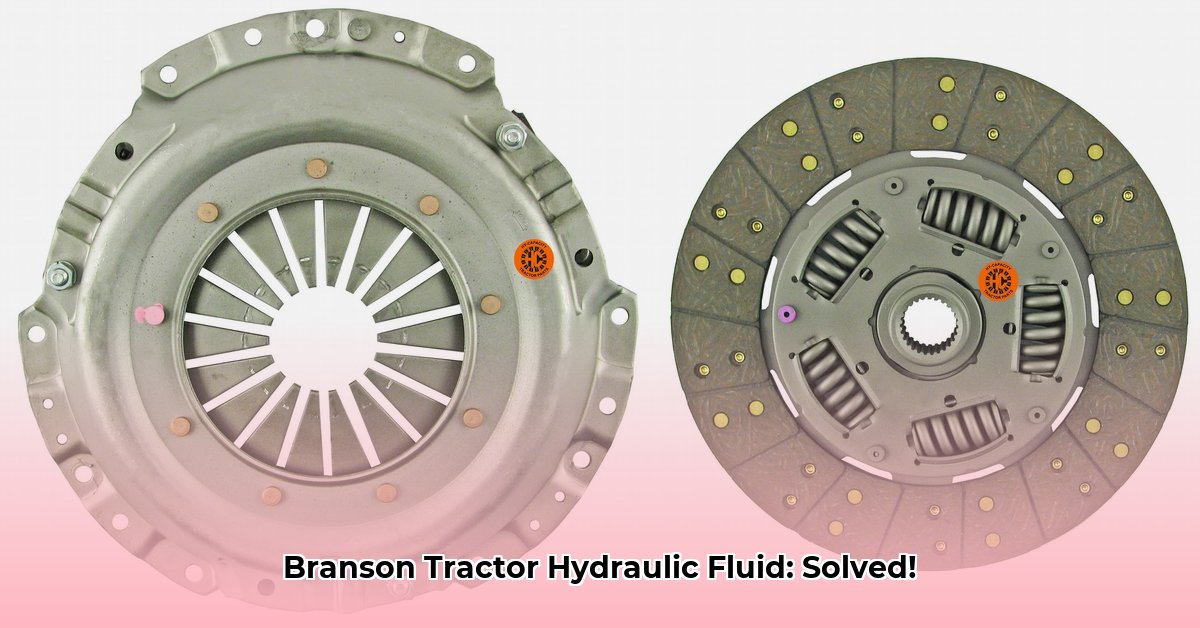
Understanding Your Branson's Hydraulic System
Your Branson tractor's hydraulic system is vital for its operation, powering functions like the three-point hitch, power steering, and front-end loader (FEL). Maintaining this system requires using the correct hydraulic fluid and adhering to a regular maintenance schedule. Neglecting this can lead to costly repairs and downtime. The first and most important step is consulting your owner's manual. It specifies the exact type and quantity of hydraulic fluid required for your specific Branson model and year. Is this step often overlooked? Yes, and it's a mistake that can be quite expensive to fix. Ignoring this guidance is akin to using the wrong fuel in your car – the results can be catastrophic. For more information on selecting the right fluids, see this helpful guide on tractor hydraulic fluid.
Different Branson models have varying hydraulic system designs. Older models might tolerate fluids that wouldn't be suitable for newer tractors. Newer Bransons often require higher-performance fluids formulated to meet more stringent specifications. Models equipped with hydrostatic transmissions (HST) frequently necessitate a special fluid designed for both hydraulics and wet brakes. Similarly, tractors with FELs may benefit from a heavier-duty fluid designed to withstand the additional stress. This is comparable to using a stronger type of oil in a high-performance engine. Do you frequently use your front loader? Then choosing a heavier-duty fluid is a smart investment.
Choosing the Right Hydraulic Fluid: A Practical Guide
Selecting the appropriate hydraulic fluid is crucial. Several reputable brands offer premium tractor hydraulic fluids formulated to excel in demanding agricultural applications. Brands such as Napa Premium Tractor Fluid, Traveler’s (often found at Tractor Supply), and Atwood's are frequently recommended by experienced tractor owners. Fluids meeting standards like JD 20c or Kubota HDN are also strong contenders. These premium fluids generally provide superior performance, longer lifespan, and better protection against wear compared to cheaper alternatives. However, selecting the right fluid is not just about brand preference.
A common mistake is overlooking the environmental factors. The climate you operate in significantly affects the ideal viscosity (thickness) of your hydraulic fluid. Extreme cold can thicken the fluid, hindering performance, while extreme heat can thin it, reducing its lubricating properties. Your owner's manual should provide guidance on selecting the correct viscosity grade based on your geographic location and expected operating temperatures. Choosing a fluid outside this range invites potential problems. Have you ever experienced sluggish hydraulics in cold weather? This is often due to the wrong viscosity of fluid.
Many user reports indicate that 303 fluids, while budget-friendly, don't perform well in Branson tractors manufactured after 1974. They frequently report a noticeable decrease in lifting power, as well as strange driving characteristics. This is almost certainly due to the fluid being too thin for the newer, more demanding systems, leading to reduced performance and the potential for component damage. This underscores the importance of checking your owner's manual first.
Changing Your Tractor's Hydraulic Fluid: A Step-by-Step Guide
Changing your Branson's hydraulic fluid is a relatively straightforward procedure, but it's crucial to follow the steps meticulously to avoid complications. Remember, safety first!
Consult Your Owner's Manual: This is the most important step. Your manual provides detailed instructions tailored to your specific tractor model.
Gather Supplies: You’ll need a suitable drain pan, the correct amount of new hydraulic fluid (as specified in your manual), and potentially a pump for easier refilling. A torque wrench is highly recommended to ensure proper tightening of the drain plug, preventing leaks.
Prepare the Tractor: Ensure the tractor's hydraulic system is cool and the engine is off before proceeding. Never work on the system with the engine running.
Drain the Old Fluid: Carefully follow your manual's instructions for draining the contaminated used fluid. Use appropriate safety precautions to prevent accidental exposure.
Clean the System: Before refilling, inspect access points for any debris. Remove and clean or replace filters as needed.
Refill with New Fluid: Once clean, carefully pour in the specified amount of new hydraulic fluid. Never overfill! Refer again to your owner's manual.
Check Fluid Level: After refilling, check the fluid level using the dipstick. Add more if needed.
This carefully executed process ensures optimal hydraulic system performance.
Maintaining a Healthy Hydraulic System: Proactive Strategies
Regular maintenance is inexpensive insurance against major repairs. Checking fluid levels frequently is crucial. Low fluid levels can lead to poor performance, especially under heavy loads. Regular visual inspections of hoses, lines, and connections for leaks are also essential. Even a small leak can quickly lead to significant fluid loss, compromising performance and causing potential damage. Ignoring these warnings can amount to neglecting regular car maintenance – a small issue becomes a major problem.
Adhering to the recommended fluid change intervals outlined in your owner's manual is vital. Hydraulic fluid degrades over time, losing its lubricating properties and picking up contaminants. Dirty, contaminated fluid increases the risk of wear and tear on critical hydraulic components. This is akin to extending the oil change interval in your car – it could lead to serious engine damage, resulting in much higher costs. Following the recommended schedule helps prevent such costly scenarios.
Key Takeaways:
- Selecting the correct hydraulic fluid is paramount for optimal Branson tractor performance and longevity.
- Always consult your owner's manual for model-specific fluid recommendations.
- Regular fluid level checks and maintenance drastically reduce the risk of costly repairs.
- Understanding your tractor's hydraulic system improves both operational efficiency and overall lifespan.
This guide provides the actionable intelligence needed to keep your Branson tractor's hydraulic system in top condition. Remember, preventative maintenance is far more cost-effective than emergency repairs.